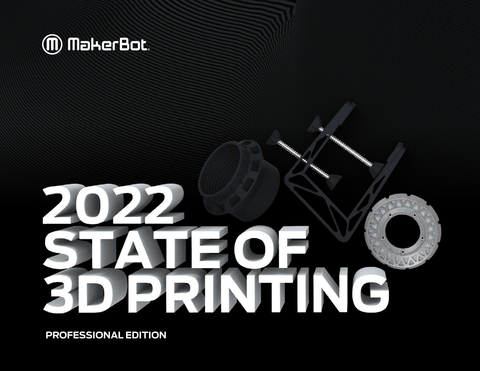BROOKLYN, N.Y.--(BUSINESS WIRE)--MakerBot, a Stratasys company (Nasdaq: SSYS), has released the results from its latest survey on the 3D printing usage habits and investment plans of nearly 1,200 professionals from around the world. The study finds continued strong adoption of 3D printing, with 77% of respondents saying they made 3D printing investments in 2021, and 69% expecting to do so this year.
The figures represent an increase from last year’s survey, in which 74% of respondents said they planned new 3D printing investments in 2021, showing growing optimism in the segment. Moreover, in this year’s study, 84% of respondents who invested last year said they plan to purchase more equipment, materials, and accessories in 2022 in order to address new applications, whether that’s prototyping, tooling, or even expanding to mass production—something new for respondents.
“In the midst of tremendous disruption around the world, professionals in design, engineering and manufacturing see 3D printing as the way forward,” said Nadav Goshen, CEO of MakerBot. “The results from our report show an eagerness to increase both use and spend as 3D printing demonstrates its ability to accelerate product development and transform businesses.”
Additional insights from the report include:
- Among the benefits respondents are experiencing, in addition to improving design and prototyping processes, respondents cite improving their R&D projects (57%), and reducing dependencies on external suppliers (35%).
- For the first time, some respondents are tying investments to enabling large scale manufacturing (8%).
- 3D printing is continuing to expand outside of functional prototypes and concept modeling. Its use for research and development (78%) is the primary application among healthcare respondents, while R&D is listed as one of the top three applications for respondents in consumer products.
- Respondents want to see continued improvements in the technology. Better print quality (83%), faster printing speeds (65%), and larger build volumes (52%) were among the top features that will need refinement.
- Respondents would also like the 3D printing industry to evolve in the next 3-5 years to meet the changing demands of its users, with many eager to see 3D printing start to play a bigger role in the supply chain (44%) as well as be utilized to localize manufacturing (32%). 33% of respondents would also like better practices in the industry to help reduce 3D printing waste.
- Interest in the sustainability of 3D printing is growing. For instance, 22% of respondents use 3D printing to help them reduce manufacturing waste, while 38% expect improvements in sustainability and recyclability efforts in the next 3-5 years.
For the full report, visit https://pages.makerbot.com/22PRO3DPrintingTrendReport.html
About the study
MakerBot’s latest report includes survey responses from nearly 1,200 professionals who are in its global network. Respondents are based globally and represent more than 20 industries, including aerospace, automotive, fashion, government, healthcare, utilities, consumer products, industrial products, and more. Respondents’ job roles vary, and includes a mix of participants from engineering, development, design, production, manufacturing, print or lab operations, supply chain operations, procurement, senior management / C-level, among others.
About MakerBot
MakerBot, a Stratasys company, is a global leader in the 3D printing industry. MakerBot empowers the engineers of today and tomorrow with its powerful additive manufacturing ecosystem. The company strives to redefine the standards for 3D printing for safety and emissions, reliability, accessibility, precision, and ease-of-use. Through this dedication, MakerBot has one of the largest install bases in the industry, runs Thingiverse—the largest 3D printing community in the world—and has members on the UL 2904 standards committee to ensure it is on the cutting edge of emissions regulations.

